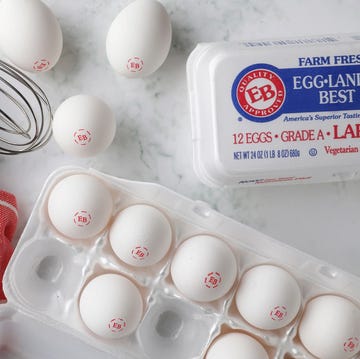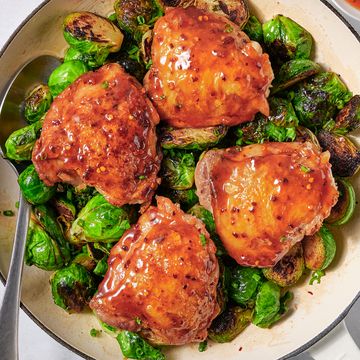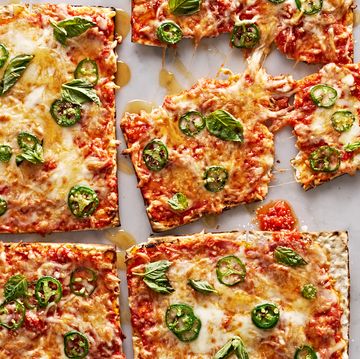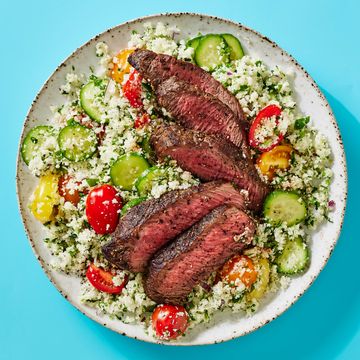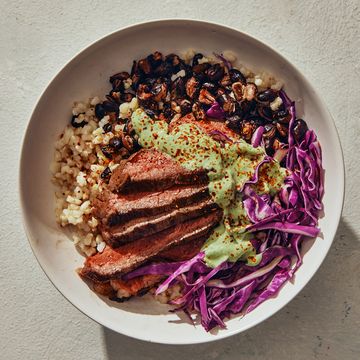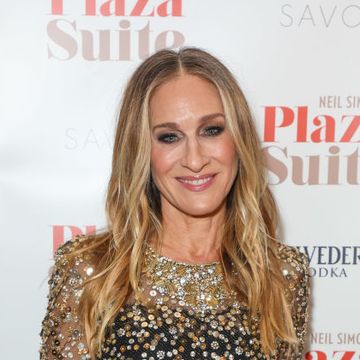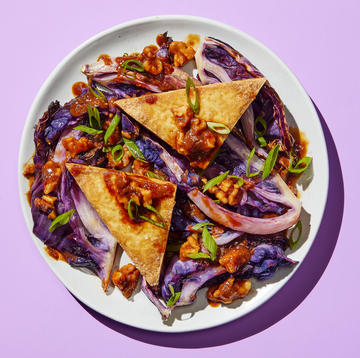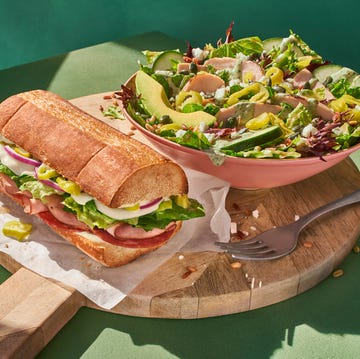I'll never forget the time that a co-worker at a former job invited me to go to our office cafeteria with her one afternoon to get an ice cream sandwich (it was the featured snack for the day, and the kitchen staff were making each sandwich by hand). Left to my own devices, I probably wouldn't have gotten a peanut butter-and-jelly ice cream sandwich at 3:30 p.m. on a weekday. But I was also fairly new to the job and wanted to play nice with my colleagues—so a group of three of us ended up going to the café.
Since the express purpose of our little outing was to get dessert, I ordered my ice cream sandwich right away. But as the other women saw the giant scoops of vanilla ice cream being heaped onto my sandwich, something shifted. Suddenly, they couldn't stop talking about how "massive" it was. And while I offered to split my sandwich with one or both of them, some intangible jury had already ruled that the ice cream sandwiches were now gross. So after all of that, I was the only one who went back to the office with an ice cream sandwich. And rather than bonding with my co-workers, I now felt more isolated from them.
Something similar has almost certainly happened to you at one point or another. Maybe taking a free cupcake from your office's break room has earned you a less-than-friendly glance from your dieting colleagues. And health-minded eating choices don't make you immune, either—maybe you've ordered a salad at brunch and then were accused by your girlfriends of being "no fun" because you didn't get a burger like they did.
Food shaming has become so rampant that a recent episode of Inside Amy Schumer even included a scene in which a group of friends keep repeating the refrain "I'm so bad" about their various dietary transgressions. The joke is that the women are too preoccupied with their food guilt to pay much attention to the acts they should feel remorseful about, including cyber bullying a young girl, hurting a gerbil, and bringing a smoke machine to a burn-victim unit. Here's the clip (and it's slightly NSFW, by the way):
Inside Amy Schumer
Get More: Comedy Central,Funny Videos,Funny TV Shows
"It's normal in our culture to obsess about food this way and to judge our choices and to label foods as 'good' or 'bad,'" says Michelle May, M.D., author of Eat What You Love, Love What You Eat. "Here's the problem: When we judge food as being 'good' or 'bad,' we also judge ourselves and other people as 'good' or 'bad,' depending on what we ate."
Why We've Become So Judge-y About Food
There's no simple answer to why so many of us have gotten into the habit of making the people in our lives feel guilty about their food choices. "It's obviously complex, and I think it has a lot to do with messages that we receive, sometimes early on from parents and then increasingly from friends and the media and health professionals," says May. Ultimately, we learn, through all of these sources and others, that we "should" be eating kale and quinoa and avoiding steaks and onion rings. The problem, of course, lies in the fact that our bodies don't always crave the foods that fall squarely into the "should" category—and so we start to judge ourselves and those around us for not following these strict food rules that society has outlined for us.
"Food is not intrinsically good or bad—that in and of itself is a judgment," says May. Thinking of what we eat in that way often grossly oversimplifies nutritional nuances (just think about how low-fat foods used to be all the rage and now studies show that a certain amount of fat is actually essential for good health). But we've convinced ourselves that the definition of healthy eating is black and white—and that we, by association, are either virtuous or sinful, depending on what we've eaten recently. Never mind the fact that this completely ignores what else we've eaten that day, what we will be eating, what our specific medical conditions are, and what our individual health goals are.
In some cases, food shaming can come from friends and loved ones who genuinely intend to help you achieve certain health goals (which you may or may not share). But in many cases, negative comments from others are a sign of their own insecurities. "My sense is that people are more likely to pass judgment on other people's styles of eating when they're less grounded and comfortable with their own way of eating," says Lori Lieberman, R.D., M.P.H., author of Drop the Diet: Guided Recipes for Overcoming Your Food Rules. "They're projecting," agrees Evelyn Tribole, M.S., R.D., co-author of Intuitive Eating. "The truth is they're free to get whatever they want to, regardless of what everyone else is eating. It's not your responsibility to make them happy or sad based on your own eating for your own body."
Your Body On Food Shaming
You might think that food shaming (and self-food shaming for that matter) isn't necessarily harmful—particularly if it encourages healthy eating. But experts say that judgmental comments about food are incompatible with mindful eating because they teach us to second-guess the signals we're getting from our own bodies and to instead rely on inflexible food rules.
"A lot of people seem to have this perception that we're one bite away from disaster in the form of obesity or a heart attack," says Tribole. "What happens is when a person has not had enough experience connecting with their body, it creates distrust and fear-mongering. And the more someone lives in 'the rules,' the more it reinforces that whole cycle."
In fact, experts agree that we were born with the ability to eat based on our body's cues. But often, we train ourselves to ignore what our body is telling us because it doesn't fall in line with what we feel like we "should" eat—or what others are telling us we should be eating.
"If you're on the receiving end of a comment and you feel affected by it, that's going to disconnect you from your own signals of hunger, fullness, and satisfaction," says Tribole. "You're eating according to what others would have you eat, according to whatever their rules are—so the more disconnect there is, the bigger the problem. It becomes easier to eat in the absence of hunger, and it becomes easier to have cravings that aren't satisfied."
The more we listen to this food shaming—whether it's coming from ourselves or someone else—the more detrimental it becomes, say experts.
"That belief that 'I'm a bad person' has a really negative consequence because the truth is that if we believe we're a bad person, then what the heck—why not keep overeating?" says May. Then, after over-indulging, many people will try to earn their way back into good standing (as mandated by our culture's food rules) by restricting and depriving themselves—which is one of the most powerful triggers for overeating, says May. The result is something she calls the "eat-repent-repeat cycle."
Ultimately, spending so much time focusing on what you "should" eat and beating yourself up about consuming things that don't fall into that category gives credence to the harmful belief that you can’t trust yourself and your body to make your own food choices. Eventually, it can lead to an obsessive and dysfunctional relationship with food and, in some cases, even more severe problems like disordered or secretive eating, say experts.
How to Break Out of the Cycle of Judgment
As you may have guessed by this point, letting go of "good" food/"bad" food thinking is key to embracing a healthy, shame-free approach to eating—but that doesn't mean that you have to consume ice cream and cookies whenever you have the slightest desire to indulge in something sweet.
"There's nothing wrong with having healthy food preferences," says Tribole. "The issue is when it becomes rigid and when you take on an all-or-nothing attitude."
In other words, if you're choosing between the fruit bowl and a chocolate chip cookie and you would legitimately be happy with either one, then by all means, choose the fruit bowl. But if you find yourself really, really wanting the cookie and you go with the fruit because you're judging your sugar craving, that's when your decision may lead to dissatisfaction—and maybe even overeating or secret eating later.
"I think the first step is to acknowledge that food judging isn't helpful, even if it's well-intended,” says May. After that, it can be helpful to try some of these techniques to break free of the food-shaming cycle:
Notice when you (or someone else) is entering judgmental territory: "It's become so integrated into our present culture that you almost can't see it," says May. Start to pay attention to when you have shaming thoughts or even when you're comparing your food choices to what others are eating—and make a conscious decision to not engage in that behavior. If you acknowledge the thought or comment and then say to yourself, "Isn't that interesting?" for example, you can explore why you or the person who made the remark started to go down that road—without judging anyone for it (which would just be counterproductive).
Start to listen to your body's signals: "You want to cultivate trust and see that your body is working," says Tribole. This often makes people nervous—especially if they aren't used to relying on their feelings of hunger and satiety to tell them when and what to eat. "You don't have to go all-in in the beginning," says Tribole. To get more comfortable with the idea, she suggests thinking about one rule you currently follow that might feel more flexible to you. For example, if you try to avoid carbs at all costs, maybe you can start to incorporate more starchy vegetables into your diet and go from there. Noting how your body responds to these—and whether they satisfy you—will help you foster a stronger connection to your body's hunger cues.
Remember that you're the only expert on you and what you need to be eating: "No other person knows what's going on in your body and what you should eat—only you can know," says Tribole. "It's almost the same idea of someone telling you how much you should pee. I know that sounds silly, but we're talking about similar kinds of physiological functions here." By the same token, if you notice yourself starting to judge others' food choices, it can be helpful to consider that you have no idea what else that person has eaten all day and what their eating and health goals may be, says Lieberman.
Remind yourself that eating "perfectly" isn’t worth sacrificing your mental health: "There's a wealth of merit to eating whole grains, fiber, etc.," says Lieberman. "But healthy foods don't equal a healthy person. ... I've seen patients who look like the picture of the 'perfect' diet—whole-grain, organic, farm-fresh, vegan, and they make their own bread. These are some of the least healthy people I've known. And that sounds shocking, but it's because they don't allow themselves to have enough or they've become so fixated on what's acceptable and what's not that it rules them." At the end of the day, you'll be much happier—and overall, much healthier—if you aren't constantly beating yourself up over every little eating "mistake."
Give yourself permission to get pleasure from food: "It's OK to include foods simply because they taste good and give you pleasure," says Lieberman. "Yes, ideally you would eat them when you're genuinely hungry so that you're eating in response to your need for fuel, but it's important to recognize that we're human and we all eat sometimes just because of stress or celebration. We're not looking to make that the norm, but it's not something to feel guilty about either." Why is this so key? "If you're feeling better about your own eating, it's much harder to be impacted by other people's comments," says Lieberman.
Your own tendencies toward food shaming—and letting yourself be susceptible to food shaming from others—won't disappear overnight. But with sustained effort, experts say you can start to reframe your relationship with food so that guilt doesn’t factor into the equation—at least not as much. "Let's get the joy back in eating," says Tribole. "If you're feeling guilty as you're eating it, you can't possibly enjoy it."
MORE: News Flash: Food Guilt Can Make You Weigh MORE
Robin Hilmantel is the digital director at Women's Health, where she oversees the editorial strategy for WomensHealthMag.com and its social platforms. She has almost 10 years of experience writing and editing for national publications, and more than 8 years of experience writing and editing health, fitness, and nutrition content specifically. In addition to Women's Health, her work has also appeared in TIME, Food Network Magazine, Cosmopolitan, New York Magazine, SELF, Glamour.com and other publications.



